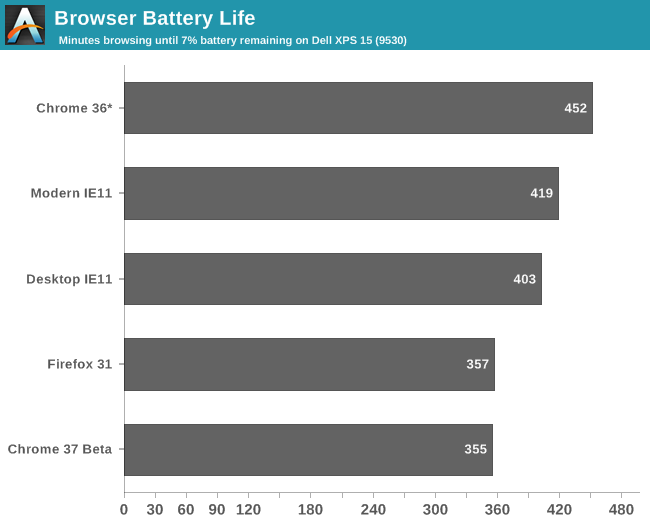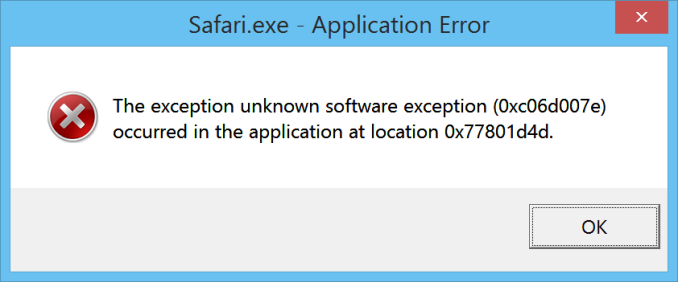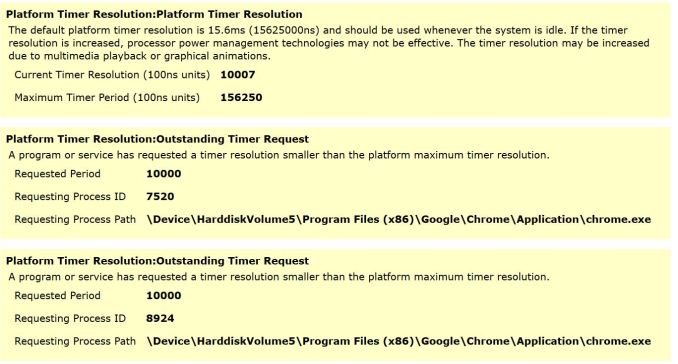Browser Face-Off: Battery Life Explored 2014
by Stephen Barrett on August 12, 2014 6:00 AM ESTResults and Analysis
There is a lot to talk about with these results. While Google Chrome's 1ms timer request certainly uses more power than otherwise, everything else about Google Chrome seems to make up the difference -- at least for Chrome 36. Unfortunately, Chrome 37 takes a dive of almost 25% placing it roughly tied for last place with Firefox. Considering Chrome 36 and Safari are the only browsers on our list that do not support HiDPI displays, that could be the difference. I have added an asterisk on the chart to indicate Chrome 36 is not quite doing the same work as the other browsers. There seems to be a significant battery penalty when natively rendering at 3200x1800 instead of 1600x900 and then scaling up via Windows.

It would be interesting to repeat this test on a lower resolution display, but that would be largely academic, as many laptops today ship with HiDPI displays and more are always on the way. To be honest, I'm not sure anyone could actually use Chrome 36 on a HiDPI display without going crazy anyway, so the fact that Chrome 36 leads the pack here is probably irrelevant.
Update: Chrome has been tested at 1600x900
Just to confirm, I did run a powercfg /energy report and Google Chrome was indeed requesting the high resolution timer.
Energy report while Google Chrome was browsing our test web sites
A few of our test websites also contain flash advertisements, so I was curious if these also caused Firefox and IE11 to increase their timers. Running the same powercfg /energy report did not show any timer increase for those browsers.
Energy report while Firefox or IE11 were browsing our test web sites
As for Safari, unfortunately the browser was having all kinds of trouble being automated by our test suite. The browser window would lose focus every ten seconds and result in lost keyboard inputs. Looking into task manager, whenever Safari would lose focus "Windows Error Reporting" would appear in the processes list. After disabling the Windows Error Reporting Service, Safari instead threw unhandled exceptions every 10 seconds.

Tough to automate a program that throws errors every 10 seconds...
Apple's website does not list any known issues regarding this error. Disabling display scaling, running at 1600x900 resolution, and reinstalling Safari did not resolve the issue. Considering Safari for Windows is still on version 5.1.7 from over two years ago and apparently won't be receiving any further updates, we decided it was best to simply exclude the browser from any further testing.












112 Comments
View All Comments
leminlyme - Tuesday, September 2, 2014 - link
Well it uses Chromium, and is falsely reported as Chrome by many statistic pulling websites. I know this from experience, I'm always labeled Chrome when I exclusively use Next and 20+ versions of Opera. Opera performs almost exactly like Chrome except that it has different design features, and it was the pioneer of speed dial, something I give it a tonne of credit for as it is my single most used and useful browser feature ever.Samus - Wednesday, August 13, 2014 - link
The majority of Opera users are in Europe, and that is a statistically insignificant region of the world.USA F-Yeah!
StevoLincolnite - Wednesday, August 13, 2014 - link
Europe has over twice the population of the USA, so how does that work?MamiyaOtaru - Wednesday, August 13, 2014 - link
you don't get jokes do youseapeople - Wednesday, August 13, 2014 - link
He's probably from Europe. They don't have enough of a population density there for jokes to take hold.Spunjji - Thursday, August 14, 2014 - link
As a resident of Europe, I resent tha...Ohhhh, I see what you did there
CharonPDX - Tuesday, August 12, 2014 - link
While that is true, since they chose Safari ON WINDOWS, they should take in to account Safari+Windows market share. I'm sure it is miniscule, since Apple hasn't updated Safari for Windows in years. (The latest version is from 2012, and has received *NO SECURITY UPDATES* since.) They are testing Safari 5.1.7; Safari on OS X is up to version 7.0.5. It would be like them testing IE 9. While still technically the "current" version on Windows Vista (much as Safari 5.1.7 is the "current" version on Windows,) it's still very much not a competitor.Again, if they were going to test Safari, they should have tested it on OS X. Period.
A proper comparison would be a MacBook Pro, booted natively to OS X 10.9.4 and Windows 8.1, testing each latest browser version. That would show difference between Firefox and Chrome on Windows vs. OS X that would be a baseline for comparing Safari and IE, as well.
Morawka - Wednesday, August 13, 2014 - link
safari on mac has so many jerry rigged optimizations it would be totally unfair to compare it to windows based web browsers which have to be used on a huge variety of hardware, unlike safari on ios and osx.xype - Wednesday, August 13, 2014 - link
Ugh, do you seriously think IE and Chrome don’t have optimizations? Do you think the IE team be all "Well, it has to run on at least TWO Windows versions, let’s just keep it all unoptimized, yeah?"mtbogre - Monday, August 25, 2014 - link
They aren't "Jerry Rigged" optimizations any more than Windows using GL to render IE are "Jerry Rigged". The browsers are optimized for the underlying OS, that's a good thing.The bigger point here is that Safari on Windows is relevant to almost no-one. They might as well have tested out the AOL browser or thrown Netscape Navigator into the mix.